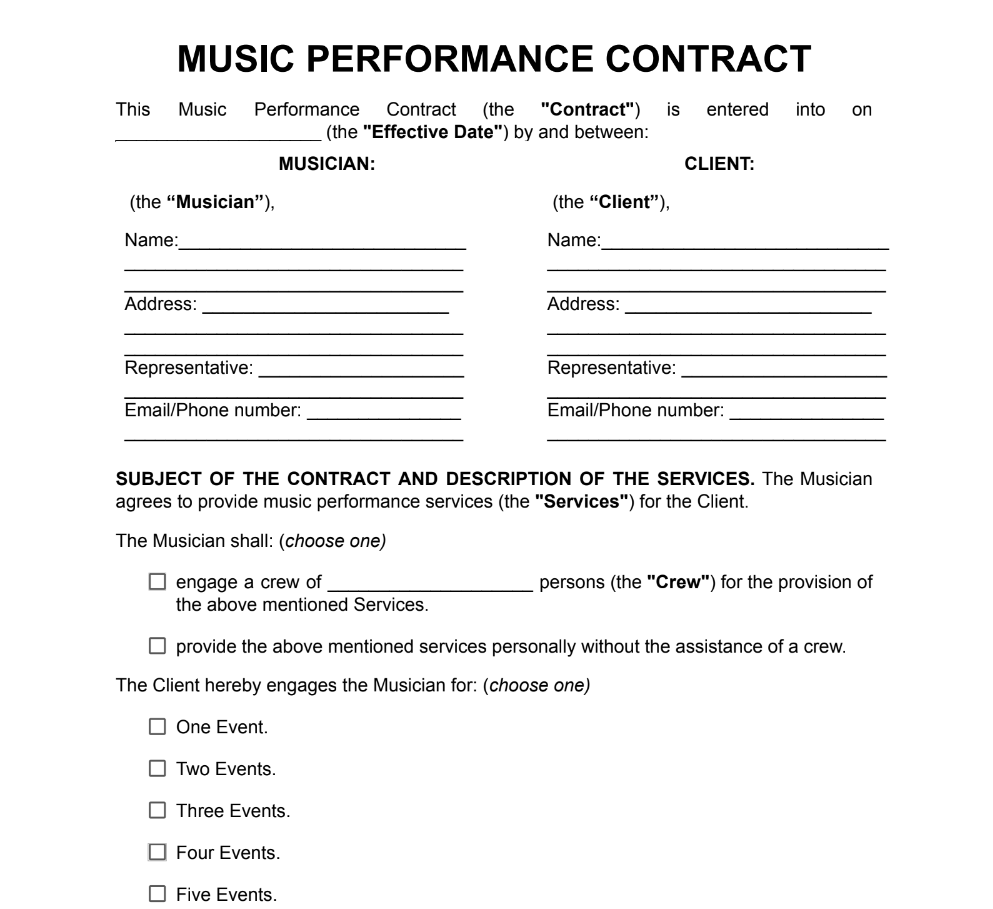When to Use a Musical Performance Contract
Using musical performance contracts is beneficial for both event organizers and performers as it ensures their agreement adheres to legal standards and clearly defines each party’s responsibilities. Also, this contract helps in selecting the right performer who meets the event’s requirements.
Event planners or organizers typically use a music performance contract template in the following scenarios:
- When hiring musicians or bands for a new event;
- When booking entertainment for recurring events or special occasions;
- To update agreements with performers who have been rebooked;
- When comparing multiple performers for the same event to ensure the best fit.
Terms and Parties of the Musical Performance Contract
A standard musical performance contract involves two main parties:
- Event organizer: The individual or entity responsible for planning and hosting the event. They handle the contracting process and review the performance details provided by musicians or bands.
- Performer: The musician, band, or entertainment group agreeing to provide a performance at the event. They are required to share details about their performance, including duration, setup requirements, and any specific needs.
Using a clear and comprehensive musical performance contract can improve the understanding and execution of the agreement. Key terms defined within the contract include:
- Performance details: Specifics regarding the performance, such as timing, duration, and type of entertainment to be provided.
- Payment terms: Information on compensation for the performer, including payment amount, schedule, and any deposit requirements.
- Cancellation policy: Conditions under which the contract may be canceled by either party, including any associated penalties or required notice periods.
How to Create a Musical Performance Contract
Crafting a musical performance contract is simple and guarantees that musicians and event organizers have the same understanding of the event’s specifics. Here are a few steps to follow:
- Choose a contract template: Use a music performance contract template free in PDF or Word format. These templates are pre-structured, easy to edit, and include all the necessary sections for a performance agreement.
- Include performer and event details: Clearly specify the performer’s name, contact information, and event details, such as date, time, location, and type of event. Make sure to outline any specific performance requirements or special arrangements.
- Outline payment terms: This section should detail the payment amount, method, and schedule, including any deposits or additional fees. Clearly state the terms of payment to ensure transparency and avoid misunderstandings.
- Define performance obligations: Include specifics on performance duration, setup and soundcheck times, and any equipment or technical needs. This helps both parties understand what is expected during the event.
- Add a cancellation clause: It’s important to include terms for cancellations or rescheduling, specifying any notice periods or penalties that may apply if either party cancels.
- Signatures: The final step is for both the event organizer and performer to sign the contract, confirming their agreement to the terms laid out. This signature certifies that all information is accurate and that both parties are committed to the agreement.
Using a clear and comprehensive musical performance agreement is advantageous for both event organizers and performers. It provides a structured agreement that helps ensure a successful performance by clarifying expectations and responsibilities, leading to better coordination.
 Preview
Preview

 Preview
Preview
